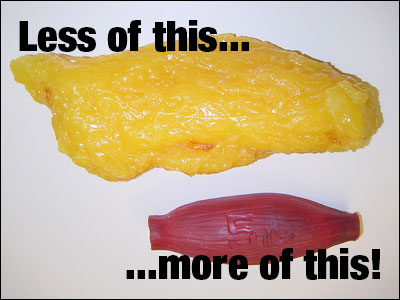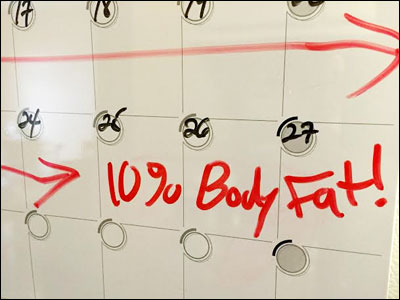“The secret of getting ahead is getting started.” – Mark Twain
A trainer once told me about a woman who asked her to help her lose thirty pounds in less than one month for a wedding she was standing up in. When asked the woman said she knew about the wedding for several months, and then had a fit when the trainer explained to her that with so much fat to lose she should have started dieting when she found out about the wedding instead of waiting til the last minute. Unfortunately, stories like this are all too common and every trainer I know has at least a few. There are many reasons people have unrealistic expectations of how quickly they can lose fat, but the two biggest are because we are constantly bombarded with exaggerated weight loss claims in advertising for supplements, diets, and exercise programs and gadgets, and because most people fail to distinguish between losing fat and losing weight.
Fat Loss Versus Weight Loss
Your body shape is primarily determined by three things; your skeletal structure, your muscles, and your fat. You can’t do much about your skeletal structure (without major surgery), but you can alter the size of your muscles and the amount of fat on your body. To develop the most physically attractive physique possible with your skeletal structure requires you to achieve a proper balance of muscle and fat mass, which for most people means more of the former and less of the latter. This is why it is important to distinguish between losing fat and losing weight indiscriminately; if you lose muscle mass or other tissue along with your body fat you may be lighter and smaller but your body composition will not have improved much and your body won’t look much better. You can even gain weight and look better if you are increasing muscle mass while losing fat. When it comes to improving your physical appearance the mirror matters far more than the scale.

Unfortunately most people focus more on the scale, and while it is possible to rapidly lose weight indiscriminately with diets involving severe calorie and carbohydrate restriction and dehydration due to significant loss of muscle mass and muscle glycogen and water in addition to fat, it takes a lot more time to lose only fat. For example, it is possible for a person to lose ten or more pounds of body weight from water in under a week but it would take most people three weeks or longer to lose the same amount of fat because there is a limit to the rate at which your body can get energy from your fat stores (about thirty calories per day per pound of fat) (1). Since the limit is proportional to how much fat you have the more you lose the slower you can lose it. To make matters worse the last places we tend to lose fat are usually the places we want to lose it the most.
This is just one of the reasons prolonged severe calorie restriction is a really bad idea, and why piling chronic “cardio” on top of it in an attempt to increase your calorie deficit makes things even worse. If your calorie deficit exceeds the energy available from your fat stores your body is going to get the rest of the energy it needs from other tissues, including your hard-earned muscle mass. The more fat you lose the less energy you can get from your remaining fat stores, the larger the remainder your body must make up by catabolizing your muscles and other tissues, causing you to lose fat more and more slowly while losing muscle more and more quickly.
How Fast Can You Really Lose Fat?
If your body can get around thirty calories per day per pound of fat you can lose on average around one pound of fat per week for every seventeen you have. Seventeen pounds of fat times thirty calories per pound per day times seven days in a week equals a little over the approximate number of calories stored in a pound of fat. Keep in mind that like most things, these numbers will vary between individuals and these should be considered starting points from which to make conservative estimates and adjustments based on how your body responds. If you want to maintain or even gain muscle while losing fat you should err conservatively with your calorie deficit.
If you want to estimate how long it will take you to lose a certain amount of fat, you need to also need to consider how the rate of fat loss will get slower as you get leaner, which can be done by averaging the rate allowed by your current body fat in pounds and your target body fat in pounds. For example, if you have forty pounds of fat and you want to lose twenty, your starting deficit can be as high as twelve-hundred but your ending deficit shouldn’t exceed six hundred, so your average deficit will be under nine-hundred. That gives you an average possible rate of fat loss of around one and three-fourths pounds of fat per week, and at that rate it would take you around twelve weeks to lose twenty pounds of fat (the same amount we get when we divide the average of forty and twenty pounds of fat by seventeen) if you start close to the max deficit and adjust downwards as fat is lost. However, since all these numbers are estimates including the results of most body composition measurements and calculations for daily energy expenditure, and since you should err on the conservative side with your calorie deficit to allow for maintenance or even an increase in muscle mass, you should add a couple more weeks to this if you want to set realistic goals for fat loss.
If we err conservatively with the deficit and estimate an average rate of fat loss of one pound per week per twenty pounds of fat instead of seventeen the average for the example above comes down from one and three-fourths to one and a half pounds per week, increasing the time it takes to get from forty pounds of fat down to twenty by around twelve weeks to fourteen.

To estimate your starting fat mass multiply your current weight by your percent body fat. To estimate your ending fat mass divide your starting lean body mass by your goal lean body mass percent, then multiply the result by your goal fat loss percent. For example, if you weigh two-hundred pounds and you have seventeen and a half percent body fat your starting fat mass is thirty-five pounds (two hundred times seventeen and a half percent). You would have one-hundred and sixty-five pounds of lean body mass, so if your goal was to get down to ten percent body fat you would divide that by ninety percent, giving you about one-hundred and eighty-three pounds, then multiply that by ten percent giving you an ending fat mass of about eighteen and one-third pounds. This would give you an average of around twenty-six and two-thirds, which divided by twenty gives an average fat loss of around one and one-third pounds per week. At this rate it would take around thirteen weeks to go from thirty-five pounds of fat down to eighteen and one-third.
If you play around with different starting and ending numbers you’ll notice it takes less time for a fatter person to lose a particular amount of fat than a leaner person. It would only take about eight weeks for someone starting with sixty pounds of fat to lose twenty, while it would take about twenty weeks for someone starting with only thirty pounds of fat to lose twenty. Fat never comes off as quickly as we would like it too, but if you’ve got a lot of fat to lose at least you know you if you are willing to be disciplined with your diet you can make good progress starting out. On the other hand, if you’re already lean and are planning on getting ripped you should plan to start dieting long enough in advance of your goal date while also leaving some time for fine-tuning.
Once again, these numbers are only estimates to use for realistic goal setting and planning, and depending on genetics and other factors your fat loss goals may take more or less time to achieve. Also keep in mind these are conservative estimates, and although I don’t recommend it you can lose fat a little faster if you’re willing to risk losing some lean body mass in the process to meet a short-term goal.
For more information on how you can maximize fat loss while maintaining or even gaining muscle read Getting Ripped, and if you need more personalized help optimizing your exercise program and diet I’m available for consulting by phone and video.
References:
1. Alpert SS. A limit on the energy transfer rate from the human fat store in hypophagia. J Theor Biol. 2005 Mar 7;233(1):1-13.

Comments on this entry are closed.
Your fat photo really looks like scrambled eggs. Need to make it more scary somehow.
Hey R,
I was planning to go to the store and get a pound of each from the butcher for a photo instead, but ended up being too busy yesterday. The next time I write something involving a comparison of fat and muscle density I’ll do that.
Hi Drew is it possible to maintain the same bodyweight but change body composition alone?
Hey Al,
Yes, it is possible to do this. I explain how you can lose fat while maintaining or gaining muscle in Getting Ripped.
Thanks so much, Drew. I will look at it. The reason I’m asking is because ppl comment my chest looks big and defined but measurement wise there is little difference. It’s not any bigger. That’s why I’m confused.
Hey Al,
You’re welcome. Even if you’re not gaining size losing fat can cause you to look more muscular because it improves your definition.
You have covered the maximum rate of fat loss in several articles and books. What I’m wondering is, what is the rate of maximum fat gain? If the body can metabolize 31 cal of energy per pound of body fat per day, it also stands to reason there will be an upper limit on the uptake as well. Does it take longer for lean people to gain one pound of fat just as it would take them longer to lose a pound?
Hey Shawn,
While a maximum rate of loss makes sense because they body can also slow down metabolic rate to conserve energy, a maximum rate of gain would not since it would be counterproductive to survival to not be able to effectively store as much energy as possible. While lean people appear to be able to gain fat faster than fat people, how fast any individual can lose or gain fat depends on numerous factors.
Also, keep in mind 31 cals is an average, based on data from research that was not specifically designed to determine the rate energy could be obtained from the fat stores. With proper exercise and a better diet the average might be higher, and like most things it would vary between individuals.